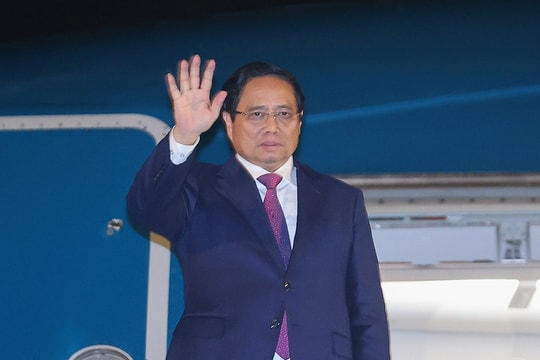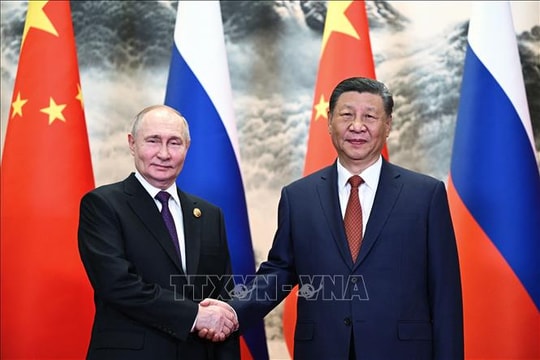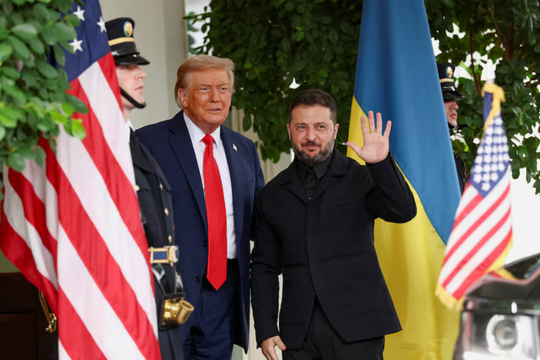Prime Minister: Vietnam - Japan relations are at their best stage
Prime Minister Nguyen Xuan Phuc: It can be said that the relationship between Vietnam and Japan is in the best period in history.
On the occasion of the first State visit of Japanese Emperor Akihito and Empress to Vietnam from February 28 to March 5, Prime Minister Nguyen Xuan Phuc gave an interview to the Japanese newspaper “Asahi Shimbun”. The following is the content of the interview.
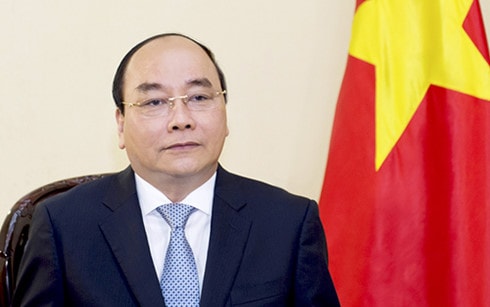 |
| Prime Minister Nguyen Xuan Phuc. Photo: VGP |
PV: Please tell us about your expectations for the official visit to Vietnam by the Japanese King and Queen. What impact will this visit have on the diplomatic relations between the two countries?
Prime Minister Nguyen Xuan Phuc: Vietnamese people know Japan as a modern, beautiful country, rich in historical and cultural traditions, the land of the Shinkansen bullet train and Samurai warriors with many unique beauties such as cherry blossoms, Mount Fuji, the ancient capital of Kyoto, and the art of Tea Ceremony.
Under the reign of the King and Queen and the leadership of the Japanese Government, Japan has risen and developed strongly, becoming one of the world's leading economies, a model for the success of the spirit of innovation and creativity in national development.
Deep within the "miracle" of Japan are the people of the land of the rising sun, who have a spirit of self-reliance, self-strengthening, a strong will to rise up and stand firm against all challenges of nature, with creativity, innovation and a spirit of disciplined and hard work.
Overcoming the ups and downs of history, with many similarities in culture and human values, the two peoples of Vietnam and Japan have bonded and built a good friendship. Here, I would like to mention a place associated with the Vietnam - Japan relationship since ancient times, that is Hoi An Ancient Town in my hometown Quang Nam province, which used to be a very busy trading port since the 17th and 18th centuries, bustling with Japanese merchant ships coming to trade.
Figuratively speaking, the Japanese Covered Bridge in Hoi An Ancient Town with its strong Japanese cultural imprint can be seen as one of the symbols of the connection between the two nations. Regarding the successes in Vietnam's economic and social development in recent years, it is impossible not to mention the valuable contributions and support of the Japanese Government and people, and Japanese investors and businesses.
For that reason, the country and people of Vietnam are extremely happy to welcome the Emperor and Empress of Japan to Vietnam for the first time. The visit of the Emperor and Empress will mark a historic milestone, a very meaningful symbol of friendship between the two peoples, opening a new chapter in the friendship, strategic partnership and extensive cooperation between the two countries.
Reporter: Please tell us your assessment of the Vietnam-Japan relationship in recent years, at present and in the future? What suggestions do you have to further promote the extensive strategic partnership between the two countries?
Prime Minister Nguyen Xuan Phuc: It can be said that the relationship between Vietnam and Japan is in the best period in history. The establishment of the extensive strategic partnership for peace and prosperity in Asia in March 2014 and the Declaration on the Joint Vision of Vietnam-Japan Relations in September 2015 are important milestones, creating a solid foundation for the development of comprehensive and substantive relations between the two countries in all fields.
Over the years, the two countries have built and strengthened political trust, regularly held high-level visits and contacts, and established and effectively implemented many dialogue and cooperation mechanisms.
Japan is Vietnam's leading important partner, demonstrated by being the 4th largest trade partner of Vietnam with a trade turnover of 30 billion USD in 2016 and increasing rapidly, and the 2nd largest foreign investor with more than 1,600 operating enterprises with a capital of up to 42 billion USD, including many large corporations investing and doing business in Vietnam such as Toyota, Honda, Fujitsu, Sony, Toshiba, Mitsubishi, Aeon... Japan is currently the country providing the largest official development assistance to Vietnam and the two countries are jointly implementing many large-scale projects in Vietnam, especially in the fields of infrastructure and energy.
In addition, the relationship between the two countries continues to make progress in the fields of security - defense, agriculture, labor, climate change response and many other fields. People-to-people exchange and tourism activities are also very active. Nearly 30 pairs of localities between the two countries have established friendly cooperative relations. The number of Japanese tourists in Vietnam is the third largest among the total number of foreign tourists to Vietnam in 2016.
The two countries also pay great attention to cooperation in the field of education. The Vietnam - Japan University was established and put into operation in September 2016 with the active and responsible support of the two governments. Vietnam also created favorable conditions for Japanese investors in the field of higher education by allowing the establishment of Tokyo Medical University Vietnam in Hung Yen province in 2015.
In the coming time, I believe that the two countries still have many opportunities to further promote cooperation. During Prime Minister Shinzo Abe's official visit to Vietnam in January 2017, the Prime Minister and I hope to continue to deepen the cooperation between the two countries, effectively and comprehensively, especially in the fields of economics, human resource training, cultural and people-to-people exchange, and to enhance understanding between the two peoples.
With the advantages of capital, advanced technology, management experience of Japan and rich resources, abundant human resources, potential market of Vietnam, the two countries can maximize their complementary advantages, enhance connectivity between the two economies, promote potential cooperation areas such as high-quality infrastructure development, high-tech clean agriculture, renewable energy, local cooperation, labor cooperation, etc.
PV: Sir, the number of Vietnamese people living in Japan is increasing rapidly. What is your comment on this and what challenges will there be for the governments of the two countries in this matter?
Prime Minister Nguyen Xuan Phuc:I am very pleased to see that as the relationship between our two countries develops, the exchanges between our peoples are becoming closer. Vietnam and Japan are two nations rich in historical and cultural traditions. The Vietnamese and Japanese people have a tradition of studiousness, self-reliance, and diligence.
The beautiful, modern country of Japan with its advanced education system is an attractive destination for Vietnamese tourists and is chosen by many young Vietnamese people to study abroad and learn a trade. Vietnamese trainees and young workers are making practical contributions to the human resources in Japan every day. Vietnam, with its dynamically developing economy, many famous landscapes, landscapes and many cultural and natural heritages, has been attracting more and more Japanese people to travel, visit, do business and live. (In 2016, there were more than 740,000 Japanese people coming to Vietnam and more than 200,000 Vietnamese people coming to Japan. Currently, there are more than 170,000 Vietnamese people living, working and studying in Japan, including about 60,000 international students and 72,000 interns).
The Vietnamese in Japan and the Japanese in Vietnam have truly been bridges of friendship, bringing our two peoples closer.
I hope that the Vietnamese and Japanese governments will continue to work together to support citizens of both countries to overcome difficulties in language, cultural understanding, customs and laws so that they can integrate, stabilize their lives, study, work and contribute positively to the economic and social life of each country.
PV: This year, Vietnam celebrates 30 years of implementing the Doi Moi policy. Could you please share your opinion on this? Vietnam is considered a newly developed country in Asia with outstanding economic achievements. Besides, there are still some problems in Vietnam such as corruption, the gap between rich and poor, policies for the investment environment that need to be improved... How does Vietnam perceive and evaluate these existing problems, and how will it solve them?
Prime Minister Nguyen Xuan Phuc: After three decades of Renovation and open door reform, Vietnam has risen from a poor, underdeveloped country to become a middle-income developing country in the region and the world. The success of the Renovation has brought Vietnam into deep and comprehensive integration into international life, building and strengthening cooperative relationships with other countries, especially neighboring countries, ASEAN countries and major countries, including Japan.
Vietnam has also achieved very important achievements in perfecting the rule of law state, strongly promoting the freedom and democracy of the people, ensuring social security, improving social welfare for the people, attaching importance to sustainable development, taking the building of a prosperous, democratic, equitable and civilized Vietnam as the central goal and driving force for development. "Doi moi" has become a Vietnamese phrase known to the world, associated with Vietnam's success story.
In the process of national development, Vietnam also faces difficulties and challenges. These include the risk of falling into the middle-income trap, unsustainable growth, low competitiveness and labor productivity, instability in the global market, climate change, corruption, the gap between rich and poor, etc.
To promote strengths, take advantage of development opportunities, and overcome difficulties and challenges, the Vietnamese Government continues to further promote innovation, perfect the market economy institution, integrate more deeply into the international community, make strategic breakthroughs, substantially restructure the economy, and innovate the growth model, improving productivity, quality, efficiency and competitiveness of the economy. Vietnam continues to implement solutions to stabilize the macro-economy, ensure major balances of the economy; improve the quality of human resources and strengthen scientific and technological potential, proactively respond to climate change, effectively manage resources and protect the environment; implement democracy, progress, social justice, ensure social security, enhance social welfare and improve people's lives.
Together with the members of the Government, I am determined to build an honest, development-creating Government that acts to serve the people and businesses; build a transparent governance system based on the rule of law and a competent, dedicated, and people-oriented leadership team; strive to improve the investment and business environment, remove barriers, and create favorable conditions for Vietnamese and foreign investors and businesses; reform administration, strengthen anti-corruption...
I strongly believe that with the determination and efforts of the Government, the will of the people, the cooperation and support of international friends, including Japan, Vietnam will continue to overcome difficulties and challenges and achieve even greater achievements in national development./.
According to VOV

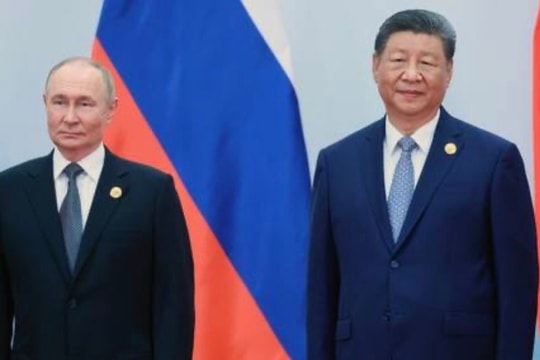
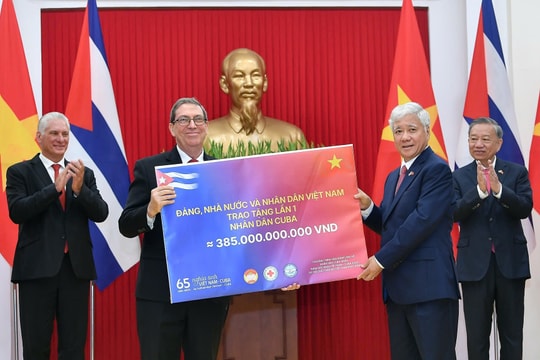
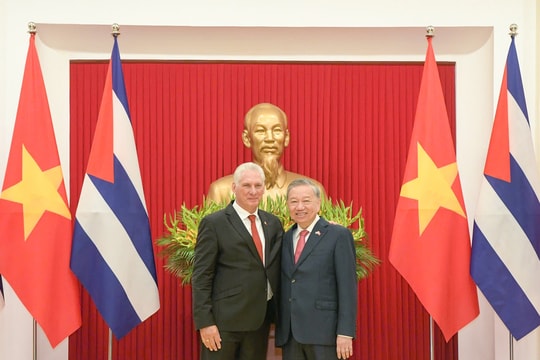
.jpg)
